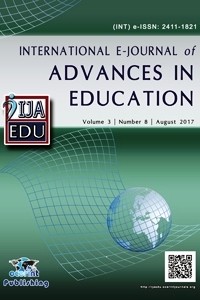
International E-Journal of Advances in Education
Yazarlar: ["Mıchalıs VARKAS"]
Konular:-
DOI:10.18768/ijaedu.1070055
Anahtar Kelimeler:School Self-Evaluation,School Development,Education Quality Improvement
Özet: Since the 1980s, education policies in many European countries have aimed at decentralization by giving educational institutions greater autonomy and responsibility for overseeing the quality of the provided education, while introducing or intensifying accountability measures. During recent years, an effort was made in Greece to promote the institutionalization of school self-evaluation and to enable the continuous assessment of education quality. Nevertheless, evaluation remains inactive or is partially implemented. Self-evaluation can be described as a process that starts from the school itself, in which carefully selected participants make a systematic description and evaluation of its operation, in order to make decisions or take initiatives for overall school development. In self-evaluation the initiative lies primarily with the school itself which chooses the means to be used and the participants. Because self-evaluation is conducted for the purpose of school improvement, stakeholder involvement, open school climate development, and transparency become critical factors. The aim of the present study was to investigate the attitudes of teachers working in a secondary education special school on the necessity and the prospects of self-evaluation in the Greek educational system and on how it should be designed and implemented to improve education quality. For this purpose, we conducted qualitative research using semi-structured interviews. Our research results show that if we want self-evaluation to be an essential tool, not just a bureaucratic obligation, it should focus on responsibility sharing and on promoting the collective character of all stakeholders involved in the educational process. Self-evaluation should help develop relationships of dialogue and cooperation, and a climate of trust among those involved, aiming not to control but to improve education. That is, to identify weaknesses and problems and to create the conditions for the improvement of educational practices by introducing innovative actions. At the same time, teachers should be given the opportunity for continuous feedback, which will enable improved planning and implementation of the related pedagogical interventions.